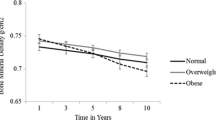Abstract.
Although bone mineral density measurements are helpful in predicting future risk for osteoporotic fractures, there is limited information available on how the results of bone densitometry influence a woman's use of therapeutic alternatives. To assess the role of bone mineral densitometry in influencing postmenopausal women to change health behaviors associated with osteoporosis, we prospectively followed, for an average of 2.9 years, 701 postmenopausal women over 50 years of age referred to an osteoporosis prevention program in a large metropolitan area. Assessments included bone mineral densitometry by dual-energy X-ray absorptiometry (with classification of skeletal health), medical history, use of hormone replacement therapy, calcium intake, caffeine intake, exercise, smoking habits, and fall precaution measures.
Women classified at baseline with moderate low bone mass were twice as likely (33%), and women with severe low bone mass more than three times as likely (47%) to start hormone replacement therapy compared with women with a normal result (13%, P < 0.001). This was true regardless of whether they had taken hormone replacement therapy in the past. Below-normal BMD was a strong predictor of a woman's initiation of hormone replacement therapy (OR 4.2; 95% CI 2.7–6.4; P < 0.05) even after adjustment for age, education, history of osteoporosis or fracture, and medical condition related to osteoporosis. Women with moderate or severe low bone mass were also much more likely to start calcium supplements (81–90% versus 67%), increase dietary calcium (71–82% versus 60%), decrease use of caffeine (44–60% versus 34%), start exercising (61–76% versus 52%), and quit smoking (22–24% versus 11%) relative to their behaviors prior to testing (P < 0.01).
In conclusion, postmenopausal women report that the results of bone densitometry substantially influence the decision to begin hormone replacement therapy and calcium supplements, increase dietary calcium, decrease caffeine, increase exercise, decrease smoking, and take precautions to prevent falls. More studies are needed to measure the long-term effects of this influence.
Similar content being viewed by others
Author information
Authors and Affiliations
Additional information
Received: 19 March 1999 / Accepted: 13 August 1999
An erratum to this article is available at http://dx.doi.org/10.1007/s002230001200.
Rights and permissions
About this article
Cite this article
Marci, C., Viechnicki, M. & Greenspan, S. Bone Mineral Densitometry Substantially Influences Health-Related Behaviors of Postmenopausal Women. Calcif Tissue Int 66, 113–118 (2000). https://doi.org/10.1007/s002230010024
Issue Date:
DOI: https://doi.org/10.1007/s002230010024




